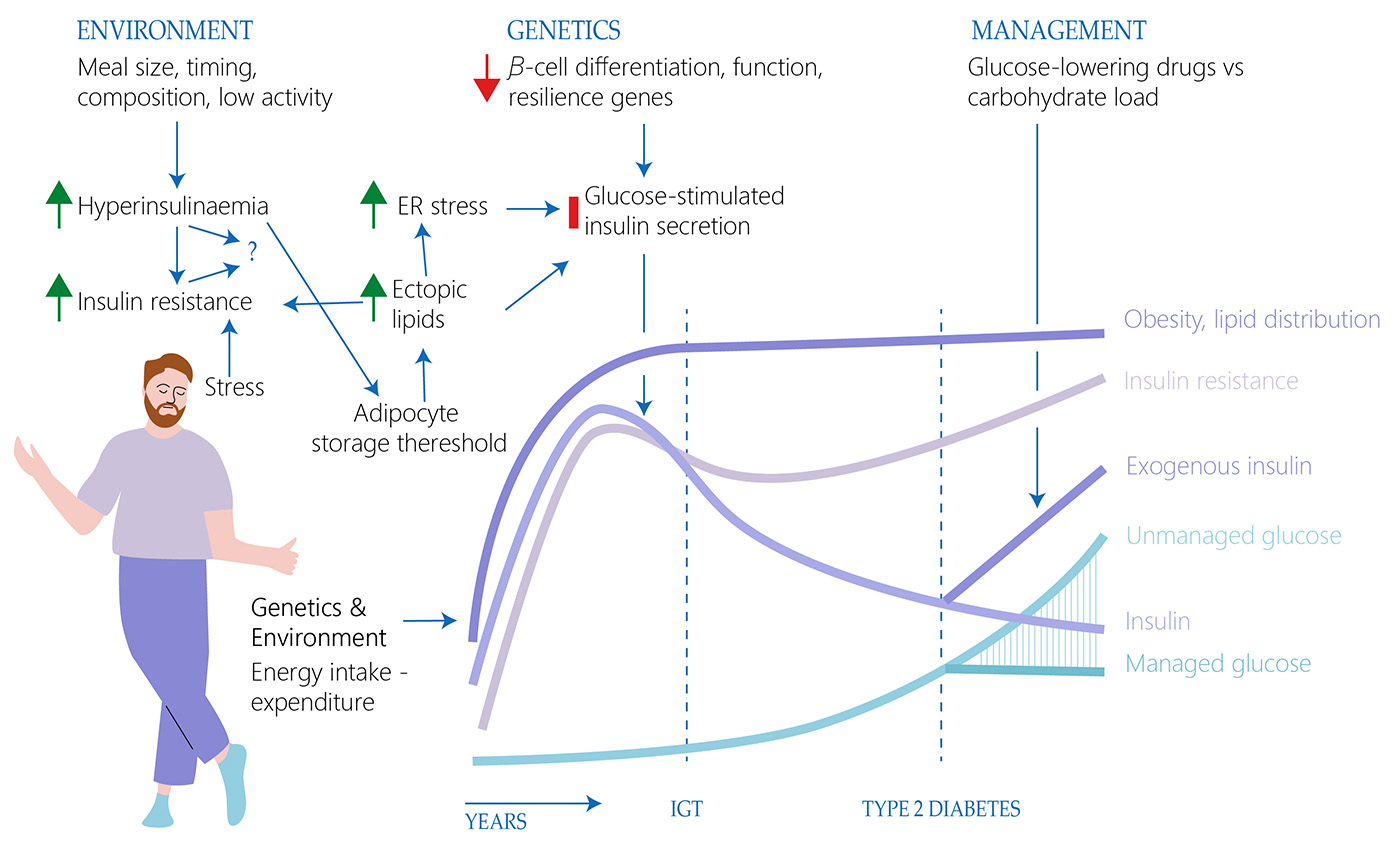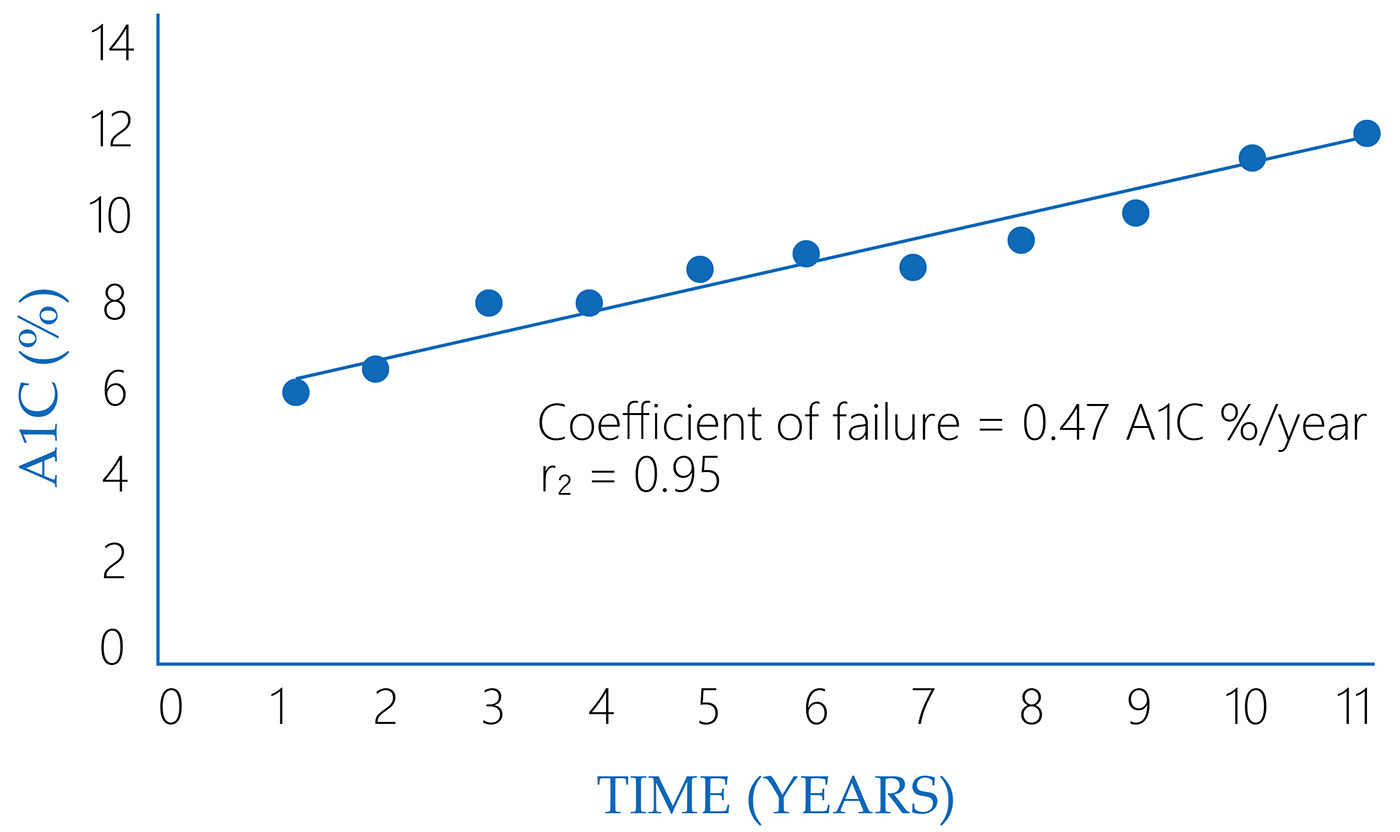Type 2 Diabetes is one of those notorious progressive diseases when you can have an established treatment protocol that won’t always be considered adequate. Read more about its progression levels.
Does Type 2 Diabetes Get Progressively Worse
In short, Type 2 Diabetes can get worse with time manifesting itself with myocardial infarctions, strokes, and mortality associated with hyperglycemia. Everything is dictated by a decline in β-cell function and one’s insulin resistance. However, all the worsening stages may greatly vary from one person to another.
What Are the Stages of Progression of Type 2 Diabetes

As per the Associations of Clinical Endocrinologists (AACE) and the American College of Endocrinology (ACE) groups, there are 4 stages of progression for Type 2 Diabetes.
Insulin Resistance
How does type 2 diabetes progress over time? Everything starts with insulin resistance. In simple terms, it stands for one’s cells, found in the liver, muscles, and fat, inability to respond to insulin well and absorb the glucose from the bloodstream. It results in the pancreas making more insulin than within healthy ranges to help glucose levels enter the cells. Accordingly, when not treated right, it leads to prediabetes.
Then, insulin resistance can manifest itself in such life-threatening conditions as Acanthosis nigricans. It stands for developing dark patches on the skin, especially visible in the back of the neck or armpits. It may also lead to Polycystic ovary syndrome (PCOS). It, in turn, causes poor or abnormal menses, painful periods as well as infertility.
Prediabetes
The second stage of pathogenesis is prediabetes. As you can guess by the name, your blood sugar levels are above the healthy range but not high enough to diagnose type 2 diabetes. This is because your cells cannot respond and absorb insulin. Hence, the pancreas makes more of it. Typical type 2 diabetes progression symptoms and prediabetes ones involve being overweight or having a fat belly. Beyond that, it is a pretty typical health condition when you have a family predisposition to it. Yet, prediabetes is a condition that can be reversed with the right treatments and healthy eating or right exercise plans.
Type 2 Diabetes
It is a health condition when your levels of glucose are abnormally high. As a result, you can daily experience intolerable thirst, frequent urination urges, and never-ending tiredness. With it, a doctor will prescribe a specific medication to take or dietary regimens. Then, you will have to visit them for regular checkups.
Type 2 Diabetes and Vascular Complications
The next consideration on how does type 2 diabetes progress over time is the appearance of vascular complications. Based on this study, involved Type 2 Diabetes patients developed the following:
|
Peripheral neuropathy |
Around 7.7% in studied individuals; |
|
Chronic kidney disease |
Around 5%; |
|
Albuminuria |
Around 4.3%; |
|
Coronary artery disease |
Around 8.2%; |
|
Heart failure |
Around 3.3%; |
|
Stroke |
Around 2.2%. |
According to the study, there were also estimated factors that have been associated with vascular complications. They included age, male sex, diabetes duration, as well as hypoglycemia. Yet, it may vary, and more studies are required to determine the possible risk of developing the condition.
How Quickly Does Type 2 Diabetes Progress

It is better to speak about type 2 diabetes disease progression symptoms that alone have specific timelines. However, looking ahead, they all may take months or even years to develop in more severe health conditions.
Progression From Pre-diabetes to Overt Diabetes
Let’s again refer to one study. Based on findings, prediabetes can progress to overt diabetes within 3-5 years. However, it concerned only around 25% of studied individuals, while approximately 70% develop overt diabetes within their lifetime. A person is most likely to start noticing the first lifestyle changes within the first year. If they want it to be reversible, a doctor will need to build a healthy diet, and increase the level of exercise.
Then, the study showed that on some occasions, lifestyle changes could be ineffective for reversing. So, diabetes drugs like Acarbose or Metformin might be prescribed.
Can Type 2 Diabetes Progress to Type 1
Unfortunately, there are many myths around the progression of type 2 diabetes to type 1. To be honest, it is entirely impossible. However, a person who has been diagnosed initially with type 2 diabetes, with time, maybe diagnosed with type 1 as well but separately.
It is worth saying that misdiagnosis is possible as well. For instance, a person with type 1 can know about type 2, especially in adulthood. Beyond that, it concerns the events when that person is overweight or is linked to a highly sedentary lifestyle. In simple terms, type 1 is a younger health condition.
If you believe there is a misdiagnosis, a second-opinion doctor’s checkup with a blood test (like hemoglobin A1C test) is required.
Behavioral Contributions to The Progression of Type 2 Diabetes
Now, let’s cover the factors which can significantly contribute to the progression of type 2 diabetes among adults and youngsters. Note, family genetic predisposition may take a significant role and a natural progression of 2 type diabetes. So, proper consultation with your healthcare provider is a must.
Fibre and High-fiber Foods
Those diabetic people who avoid high-fiber foods may be at significant risk of contributing to the progression of type 2 diabetes. Fiber is primarily found in plant-based meals. It works by helping blood sugar levels rise within a healthy range. You may need to consume soluble and insoluble fibers. Beyond that, they help reduce cholesterol absorption. What should you eat?
- Black beans;
- sweet potatoes;
- whole grains;
- various nuts like cashew and seeds like pumpkin;
- dark berries;
- lentils;
- veggies;
- citrus fruits including grapefruit, oranges, lemons, and limes.
Otherwise, you can also find health supplements for fiber that can be added to your diet. Still, a consultation with a nutritionist will be required to determine the right amounts of fiber for your particular case per day.
Sugar-Sweetened Beverages
There is enormous evidence that sugar-sweetened drinks are associated with type 2 diabetes. So, logically to assume, if you do not want the progression of the health condition, you should avoid them as much as possible. But, yes, it might be challenging if they are your guilty pleasure, so you might gradually start cutting down on them.
You will need to reduce the consumption of drinks like:
- with added sugars like brown sugar, corn sweetener, corn syrup, dextrose, molasses, raw sugar, and sucrose, among others;
- commercially products like soda, fruit juices, sports beverages, energy drinks, sweetened liquids, and coffee and tea beverages with added sugars.
Sedentary Behavior
A sedentary lifestyle is a natural enemy for diabetic people. Yes, such people may feel too tired to proceed with any activities. However, it will only contribute to the progression of diabetes. Start changing it by involving yourself in the following sports activities:
- daily walking;
- dancing;
- yoga;
- cycling;
- swimming.
It will be perfect to hire a personal coach to build a workout routine for your Type 2 diabetes.
Poor Sleeping
Diabetic people may regularly struggle with sleep disturbances. Based on average calculations, nearly one in two people diagnosed with diabetes have sleep issues because of their abnormal blood glucose levels. Their hyperglycemia and hypoglycemia gradually lead to insomnia and fatigue.
Stress
Finally, stress is another type 2 diabetes progressions contributor. It may be the first sign of irritability or uncontrolled anger. You can deteriorate personal relationships with family members or your partner. Otherwise, it can be linked to work stress. Ideally, you should avoid it by surrounding your daily environment with peace. For example, meditate, or practice yoga. Or, ask your doctor for any recommendations on supplements that may alleviate your frequent stressed behaviors.
Preventing Type 2 Diabetes Progression

There are dozens of ways of preventing Type 2 Diabetes’ progressive development. Some of the examples involve the following:
|
Cut down the consumption of sweets and refined carbs |
It concerns sugar-sweetened beverages enlisted above, as well as white flour, white rice, pastries, snacks you usually grab at work or while you sit in front of the desktop, pasta, alongside loved-by-everyone breakfast cereals. |
|
Work out |
Hire a personal coach who may exercise with you, or just build a workout routine for Type 2 Diabetes with a professional. |
|
Drink lots of water |
Your daily regimen should involve water. Yet, avoid recommendations such as 2 liters minimum per day. You have to listen to your body’s requests, or you can damage your liver and kidneys. |
|
Lose weight |
The progression of diabetes is significantly linked to being overweight. Alongside diet and exercises, ask your doctor for any recommendations on how to get rid of the fat belly gradually. |
|
Quit smoking and abusing alcohol |
Smoking a pack of cigarettes and 1-2 bottles of fine wine per day will do only harm. |
|
Watch your food portions |
It is better to eat 5 times per day in small portions rather than 1-2 times per day with massive amounts of meals. |
On some occasions, you can also stick to natural herbal health supplements that may help you control blood sugar levels.
Conclusion
The progress of type 2 diabetes is irreversible when you do not take any preventative measures. So, if you want to avoid that, consult your doctor, and stick to living a healthier lifestyle. Avoid sedentary behaviors, go for fiber diets, and exercise to keep your body fit.
FAQ
Can 2 Type Diabetes Progress to Type 1?
No, it is impossible. However, patients with type 2 diabetes may be misdiagnosed with it while having the first type.
What Are the Progression Stages of Type 2 Diabetes?
There are four of them, including insulin resistance, prediabetes, type 2 diabetes, and type 2 with accompanying vascular complications.
How Quickly Does Type 2 Diabetes Progress?
It may averagely take months to a few years. Others can have it progressed within their lifetime. It all varies.
Is Type 2 Diabetes A Progressive Disease?
Yes, type 2 diabetes is a common progressive disease when you do not treat or control it.


























